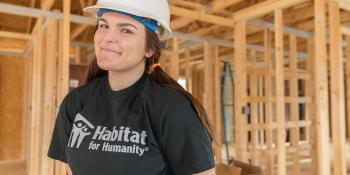
The positive impact a home can have
La Salle University nursing student Devon Harrison is well aware of the positive impact that a home can have. She spent periods of her childhood homeless.
“I never had constant living quarters,” Devon says. She and her mother sometimes stayed in motels or with friends. Some nights, Devon didn’t know where she was going to sleep.
That all changed her freshman year of high school when she and her mom moved into a house. “I did better in school,” Devon says. “I was more social.”
And now, Devon is helping another family achieve that kind of stability, joining a group of her fellow La Salle students to spend a week building with Forsyth County Habitat in Winston-Salem, North Carolina.
Spring is the time of year when college students on break fan the country helping families move closer to their dream of having homes of their own. Pounding nails, putting up trusses and working alongside future homeowners during Habitat’s Collegiate Challenge allows students to consider what a strong and stable home can mean to a family’s well-being.
Since Habitat began our Collegiate Challenge program in the late 1980s, more than 250,000 students like Devon have helped build homes across the U.S. The one-week volunteer program is offered year-round and is especially popular with college students looking for a rewarding alternative spring break. Devon and her fellow students decided to road trip the seven-plus hours from Philadelphia. Seeing a different part of the country provides a different perspective, she says.
During their week, Devon and the other students put up siding and PVC board. The highlight was getting to meet the future homeowner who would be living in the house. “It was awesome,” Devon says. “We’re trying really hard to build her and her family a home where they can grow and prosper.”
Thinking about the children inspired Devon to work even that much harder. “I kind of put myself in the kids’ shoes,” she says, knowing “that this is their house and they are going to be OK.”
